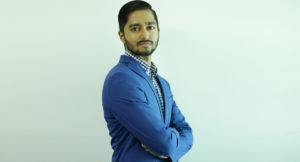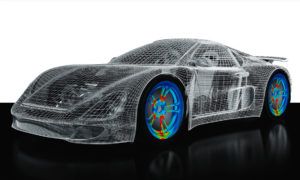Viraj Kalyani, founder of Kalyani Studio and executive director of Kalyani Forge, aims to bring creativity through design in high strength engineering solutions thereby creating a force to reckon with in this industry

From running a large, established organisation to being a startup entreprenuer, Viraj Kalyani has done it all. The nephew of renowned Baba Kalyani, Viraj, served as executive director of Kalyani Forge, forgings manufacturer. His most recent foray, Kalyani Studio (Kalyani), is an exercise in understanding the importance of design and the crucial role it plays in the future of OEMs.
As Viraj notes, OEM customers have always appreciated design inputs, especially, when they come from manufacturers. “We would often struggle to get inputs as manufacturing companies focus on their own process rather than the product,” he recalls. He saw that the engineering and design industry, which already caters partly to these requirements, did not offer any niche capabilities on high strength products. The need to infuse creativity and design into high strength engineering solutions spurred Viraj Kalyani to launch his latest entrepreneurial venture, Kalyani Studio.
The company believes in the latent power of the physical strength of products which can be unlocked through better design and engineering to improve performance and cost. “High strength products require a high level of performance. To a large extent, these are under-the-hood products and applications that withstand tremendously challenging physical conditions like forces, motion, temperature and time,” explains Viraj. Kalyani is therefore building a new ecosystem and category of high strength engineering and design to cater to OEMs across all industries like railways, aerospace, automotive, agro-tech and construction equipment. Primarily, the industry is organised around end equipment or end applications and hence, all the engineering and design ideas are focused on end applications. This is just one amongst the challenges Kalyani looks to get on top of.
The founder believes that the next wave of growth has to come from design which in his opinion is the next logical progression for the sector.
Built on outcomes
The company does product design and engineering analysis, manufacturing, prototyping and testing services and has detailed offerings based on client projects. To understand it better, Viraj says, “High strength components are physical components which get into assemblies and perform various functions like linkages, load bearing or rotation and everyone customises these components in the industry.” He continues, “Hence, it is important to standardise these components so that the focus can move on to the bigger picture and the applications get more performance.”
We don’t bill clients on time and material which is what most engineering firms traditionally do. We define a scope of work and deliver it at the right price
![]()
The company works on an outcome-based business model where it takes ownership for all the deliverables given to its clients. “We don’t bill clients on time and material which is what most engineering firms traditionally do. We define a scope of work and deliver it at the right price,” says Viraj.
The company has a project-based revenue model. It has multiple projects with different clients and also has long-term contracts where it has a multi-layer engagement. Kalyani also does onsite engineering and design. “We are tying this to our core process which is to create high tech jobs in India and build on new high strength technology,” adds Viraj.
Diversity adds strength
Funded by Viraj, Kalyani was incorporated in 2016 and started engaging on projects formally about four to five months back. Currently, Viraj works with a team of 15 to 20 people who are from diverse engineering backgrounds and aims to increase this number to 50 by the end of this financial year. The company currently has over 10 projects from multiple clients with a minimum duration of a month to about six months. “If it is a multi-year project, it could be broken down to certain milestones,” adds Viraj. Kalyani has certain research oriented projects where it does fundamental research on high strength aspects. It has recently tied up with IIT-Mumbai and is planning new concepts for its clients.
Speaking about competition, Viraj says, “In one way I can say that there is no competition as we are in a new market and industry.” He is quick to add, “Realistically speaking, there are engineering service providers, but they are highly diversified in their offerings and applications.” He opines that the industry needs to get more specialised around capabilities as one cannot aspire to be everything for everyone. “In the future, we would like to see more direct competition,” he states.
Growth through innovation
Customers are R&D engineering and innovation team members in all OEMs and the company looks for a good cultural fit with its customers. While Kalyani has a standard system for nurturing its clients and converting them from a prospective to a long-term relationship, it also demonstrates its capabilities through its projects. “Our services, design and analysis, brings them back for more. They see difference in our approach as we use a lot of design thinking,” says Viraj.
In five years, the company aims to be a pioneering force in the high strength industry while growing the industry. Kalyani plans to come out with its own specialised standard high strength components which can be used across a variety of applications. “We have aggressive growth plans and strategies and at high level staying focussed on our vision and will restrict ourselves to high strength applications and not get into consumer application,” says Viraj, on a parting note.

Quick Bytes:
Describe your current role at Kalyani Forge.
I have been the executive director at Kalyani Forge for several years now where I focus on business transformation. I always had a plan of starting a new company which will work on future areas. After starting Kalyani Studio, I have come out of the day-to-day operations of Kalyani Forge. I am currently on the Board and work on group level strategies.
What are some of the changes you made to your style of working?
From running a large established organisation to leading a startup, it has been an interesting journey. There are synergies and differences. Differences are in the scale of operation. There are established processes and systems in a large company but you have to create this from scratch in a startup. At Kalyani Forge, I emphasised the core value of entrepreneurship as it had to get nimble and more creative whereas, here, the values that I put in are different. We look at passion, pioneering spirit, as it is all about the new.
In terms of management style, in a larger organisation, I led a team, operated in multiple locations where established infrastructure is already there. And it is an extensive scope of management. In a startup, it is an intensive process where you work at individual levels and supervising individual development plans of my teams. I have introduced a concept of self management wherein a lot of the decision making is pushed down to the frontline positions.
Tell us about the responsibility of working under the Kalyani brand name.
Kalyani brand is extremely credible and high technology and innovation oriented. That’s how we look at Kalyani Studio as it stands for creativity in a new area. I work towards enhancing that brand and making it more relevant in the future.
Tell us about your experience working with Baba Kalyani.
Even though I have not worked with him in a business setting, he has been a major source of inspiration, from the time he started out to changing the way the forging industry is run at a global level. He used to work two shifts when he started out.
Hard work is a core part of our family values and we believe in working towards long term growth and profitability.